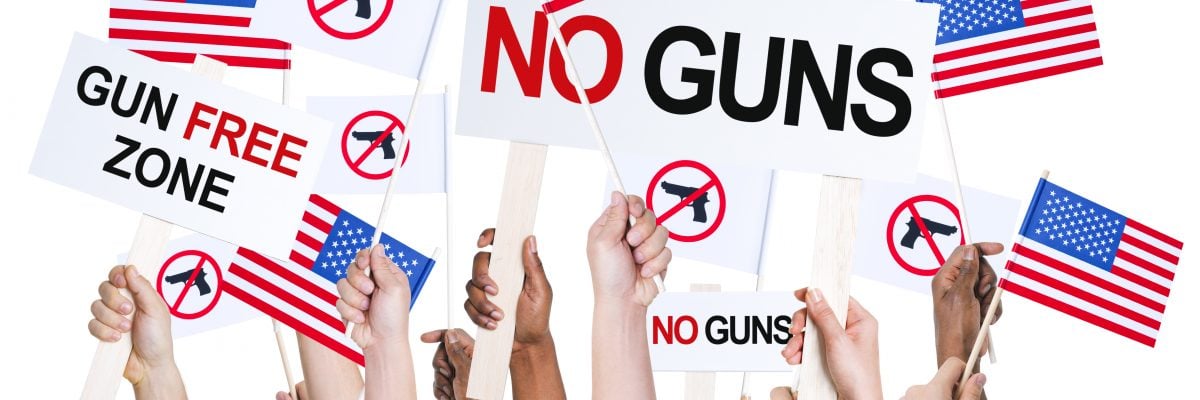
The second amendment to the U.S. Constitution reads:
A well regulated militia being necessary to the security of a free state, the right of the people to keep and bear arms shall not be infringed.
This amendment, along with the various interpretations given to its opening clause, guarantees that gun ownership will be a perennial topic in American politics.
In both legal courts and the court of public opinion, gun rights advocates have been making significant advances.
In 2008, the U.S. Supreme Court held that the second amendment entails an individual right to possess a firearm for lawful purposes, including self-defense within one’s home.
Public opinion has also shifted in recent years. Using two-year averages and data provided by the Gallup organization:
- Those who felt that the nation’s laws on the sale of firearms should be made stricter dropped from 73 percent in 1990-91 to 51 percent in 2014-15.
- In the same time frame, those who felt the laws should be less strict rose from 3 percent to 12 percent.
- Those who thought they should be kept as they are now rose from 21 percent to 35 percent.
Similarly:
- Those who thought there should be a law banning possession of handguns except by police and other authorized persons fell from 60 percent in 1959 to 27 percent in 2015.
- In the same time frame, those who opposed such a ban rose from 36 percent to 72 percent.
But what is happening in the public arena does not tell us much about what a Catholic should think concerning such subjects.
So: What does the Church teach?
Fundamental principles
Firearms can be used for different purposes (hunting, target shooting, etc.), but here we will consider their use against other humans in self-defense.
An initial point of reference is found in the Gospel of Luke, where our Lord indicates the legitimacy of the right to self-defense, telling the disciples, “Let him who has no sword sell his mantle and buy one” (Luke 22:36).
In a modern context, the Catechism of the Catholic Church acknowledges the right to use lethal force in self-defense, including on behalf of others, when the use of this force is moderate—i.e., when it is not practical to use less force (CCC 2264-2265).
The Catechism does not specify the means by which one may use lethal force in self-defense, but this may be inferred: If you are in a situation where the only effective means you have of defending your life (or that of another) is a gun, then you may use it.
Some necessary qualifiers
This brings us to the question of gun ownership: Who should be allowed to have a gun?
Of course, not everybody. Homicidal maniacs should not. Neither should toddlers.
In what follows, we’ll be considering ownership of firearms by ordinary, responsible people, responsibility including things like knowing how to use a gun and being committed to gun safety.
Statements of the universal magisterium
The Church’s universal magisterium is exercised either by the pope or by the worldwide college of bishops teaching in union with him.
I am not aware of any statements of the universal magisterium dealing with the ownership of firearms by ordinary, responsible individuals. Neither am I aware of any papal statements on this subject nor statements by bodies such as the Congregation for the Doctrine of the Faith (CDF), which also exercises the universal magisterium when its decrees are expressly approved by the pope (Donum Veritatis 18).
A search of the Vatican website on the term handgun does not turn up any results.
A search using the term firearms turns up a handful of references. These reveal that you’re not allowed to bring firearms into the Vatican museums, that the Holy See is concerned about illicit trafficking in firearms, etc.
The only statement from a body connected with the Holy See that I have been able to obtain (and it took some doing to get it, because it is not on the Vatican website) is found in The International Arms Trade: An Ethical Reflection, a 1994 document by the Pontifical Commission for Justice and Peace (PCJP). Under the heading “Furnishing Arms to Groups That Are Not States,” the document says:
It is urgent to find an effective way to stop the flow of arms to terrorist and criminal groups. An indispensible measure would be for each State to impose a strict control on the sale of handguns and small arms. Limiting the purchase of such arms would certainly not infringe upon the rights of anyone (4:8).
This document does not address the question of handguns and small arms (rifles, etc.) except under the rubric of keeping them out of the hands of terrorists and criminal organizations. It thus does not engage the broader self-defense question.
It sees “a strict control on the sale” of such weapons as important (“indispensible”) for keeping them away from terrorists and criminal organizations, but it does not define what would count as this form of control. Presumably that would be determined by the individual states.
The document does not call for a ban on the sale of such weapons. It speaks of “limiting the purchase” of them , apparently within bounds that would “not infringe upon the rights of anyone”—presumably including their self-defense rights.
Ultimately, this document does not engage the Church’s magisterium. As noted above, the express approval of the pope (then John Paul II) is required—even for the documents of the CDF—to do that, and this document does not carry John Paul II’s express approval. It is therefore a hortatory, advisory document of the PCJP but not Church teaching.
Thus we do not seem to have any doctrinal statements by popes, the CDF, or others capable of exercising the universal magisterium.
Nor has the college of bishops as a whole made such statements.
Statements of particular magisteria
By divine law, individual bishops are also capable of exercising the teaching authority of the Church in their own, particular sphere.
I am sure that various bishops around the world have expressed their views on gun ownership, though I am not aware of any who have attempted to exercise their personal magisterium in this regard. (There is a difference between a bishop expressing an opinion and his saying, “This is Church teaching.”)
What about groups of bishops?—for example, the episcopal conferences like the U.S. bishops?
These bodies do not exist by divine law. They are erected by ecclesiastical law to serve pastoral purposes, but they were not instituted by Christ, and so they do not have the same teaching authority that the pope and individual bishops do.
Consequently, episcopal conferences can engage the Church’s magisterium only in special circumstances.
As John Paul II established in his 1998 motu proprio Apostolos suos:
In order that the doctrinal declarations of the Conference of Bishops referred to in No. 22 of the present Letter may constitute authentic magisterium and be published in the name of the Conference itself, they must be unanimously approved by the Bishops who are members, or receive the recognitio of the Apostolic See if approved in plenary assembly by at least two thirds of the Bishops belonging to the Conference and having a deliberative vote (IV:1).
If a doctrinal declaration were approved by each member of an episcopal conference then it would be equivalent to each bishop engaging his own magisterium, and so there would be a foundation in divine law for seeing the declaration as an expression of the Church’s magisterium.
Similarly, if the Holy See approved (gave recognitio) to the doctrinal decree, then it would be equivalent to the Holy See exercising its magisterium, and thus there would again be a foundation in divine law. (The norm indicates, however, that the Holy See won’t consider doing this if a doctrinal declaration got less than a two-thirds vote by an episcopal conference.)
Since these conditions are rarely met, we have to read statements issued by or on behalf of bishops’ conferences with a significant degree of caution.
The U.S. bishops and guns
The views of individual U.S. bishops on guns appear to be mixed. That is virtually guaranteed by the fact there are more than 400 active and retired Catholic bishops in America, and unanimity among them on a public policy question that divides the American public is not to be expected.
Further, some bishops are known to be avid hunters and users of firearms.
This does not mean that there is not a generally prevailing opinion among the U.S. bishops. Judging by statements issued by representatives of the United States Conference of Catholic Bishops, it would appear that the general ethos of the U.S. bishops conference favors gun restriction.
Whenever there is a mass shooting, it is typical for representatives of the bishops to issue a statement of sympathy and condolence, and it is common for these statements to contain language supporting the restriction of firearms.
This is also true of statements prepared by various bodies within the U.S. Conference of Catholic Bishops.
For example, in 2000, the bishops’ Committee on Domestic Policy drafted a position paper titled Responsibility, Rehabilitation, and Restoration: A Catholic Perspective on Crime and Criminal Justice, which was later approved by the conference as a whole. It states:
All of us must do more to end violence in the home and to find ways to help victims break out of the pattern of abuse. As bishops, we support measures that control the sale and use of firearms and make them safer (especially efforts that prevent their unsupervised use by children or anyone other than the owner), and we reiterate our call for sensible regulation of handguns (“Policy Foundations and Directions” 4).
A footnote to this section states:
- However, we believe that in the long run and with few exceptions (i.e., police officers, military use), handguns should be eliminated from our society. “Furthermore, the widespread use of handguns and automatic weapons in connection with drug commerce reinforces our repeated ‘call for effective and courageous action to control handguns, leading to their eventual elimination from our society.’” U.S. Catholic Bishops, New Slavery, New Freedom: A Pastoral Message on Substance Abuse (Washington, D.C.: United States Conference of Catholic Bishops, 1990), 10.
The original source of the call for an ultimate elimination of handguns is a 1975 statement of the bishops’ Committee on Social Development and World Peace titled Handgun Violence: A Threat to Life.
While these statements indicate a prevailing and longstanding view that favors handgun restriction among the U.S. bishops, they do not constitute Church teaching.
The relevant statements are not doctrinal declarations and do not fulfill the conditions specified in Apostolos Suos for being authentic (i.e., authoritative) magisterium.
The U.S. bishops thus have not engaged their collective, particular magisterium on this question, and the statements in question are of a hortatory, advisory nature that reflects the prevailing opinion among U.S. bishops.
Conclusion
We thus arrive at the following takeaways:
1) Church teaching supports the right of individual self-defense, including the use of lethal force when necessary. It does not expressly address the means by which this may be carried out, but it is a reasonable inference that if a gun is the best way you have to defend yourself, you may use it.
2) The Church’s magisterium has not made any pronouncements regarding ordinary people possessing firearms for self-defense purposes, though the general ethos both at the Holy See and among the U.S. bishops seems to favor handgun restriction.
3) Therefore, this is an area in which, in Cardinal Joseph Ratzinger’s words, there may be “a legitimate diversity of opinion” among Catholics.



